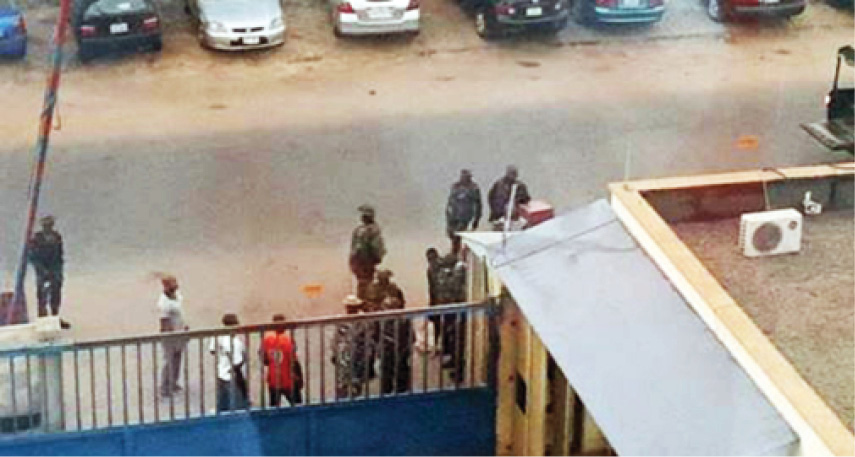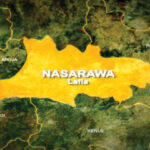Last weekend, military henchmen invaded the Maiduguri Bureau of Media Trust Limited. Without a warrant as required by law, or the needed authorisation of their commander-in-chief, they abducted two editors, Uthman Abubakar and Ibrahim Sawab, while declaring a third person wanted. They confiscated the mobile phones of the two reporters and ransacked the office, seizing computers. In a simultaneous operation, armed soldiers sealed off company headquarters in Abuja and the paper’s Lagos bureau.
With the “hostages” still with them, the army released a statement explaining its unlawful action. According to Sani Usman, the siege was to arrest reporters it accused of divulging information likely to jeopardise the lives of troops involved in counter-insurgency operations in the North East. Apparently, the military were unhappy with a report detailing moves being made to recapture towns they had earlier denied were taken by the insurgent Boko Haram. In its statement, the army accused the publication of flouting certain laws thereby constituting itself into accuser, prosecutor and judge of the law.
Like other publications, Media Trust has suffered in the hands of the military since the Boko Haram insurgency began. Its highhandedness led to the resignation of Ahmad Salkida for doing his job. Salkida had to evacuate his family and at one time even left the country for fear of his safety. Till date, no charges have been brought against him.
Under the Goodluck Jonathan administration, the military consistently seized the paper’s publications in circuit. At one time, it accused the newspaper of gunrunning, a charge it never substantiated.
It took a statement from presidential spokesman, Garba Shehu, for the military to reluctantly pull back. Reluctantly because it held to its Maiduguri “captives” along with the computers it illegally confiscated.
In Lagos, it kept its siege on the bureau way into the night in an apparent move to cripple the paper’s operations.
Going by the statement issued by Garba Shehu, the siege was not authorised by President Buhari. This is dangerous judging by history of interventions in the political space. It amounted to testing the waters for a pseudo-insurrection. It is disconcerting to see the military overstep its constitutional bounds. Not long ago, it unilaterally declared UNICEF as a spy agency and outlawed Amnesty International from its sphere of operation without talking to the civil authorities it constitutionally serves.
Shehu captured the mood well by saying that there were more diplomatic ways of handling miscommunication between the army and the media.
When news filtered that Baga and its environs had fallen, military and regime apologists flatly denied it. A story reporting efforts to recapture it is the best way to show that the news is not fake. The national press has shown patriotism and tact in the reportage of the insurgency. Thankfully, Baga is now reportedly back in the hands of our gallant troops. In the age of Google Earth, large troop or civilian movement is an open secret to anyone with the required data. To think otherwise is to live in illusion.
If the military devotes the same energy to tackling the insurgency as it uses to crush what it perceives as press insubordination, the war against Boko Haram would have been fought and won. Laying siege on media houses and kidnapping journalists would not win this war, only strategy and good intelligence would.
To quote a now clichéd statement, the world is watching and the impression being created is that the military believes it is above the laws of the land. Under our statutes, the military does not have a monopoly of patriotism. Last week’s siege is absolutely an aberration, a slap on the rule of law, free flow of information and freedom of the press, articles to which our country is signatory. It would take the declaration of a state of emergency to suspend these rights. No such state exists in any part of the country, including areas most affected by the insurgency and other forms of insecurity.
Our gallant troops continue to receive the support of the public for the supreme sacrifices they pay for national cohesion. However patriotism is not the sole prerogative of the military. The country belongs to all of us. It is both in public and military interest that journalists continue to carry out their lawful duties. Where there are infractions, the courts are our final arbiters. No group should constitute itself into the law just because it wields weapons.
While the press could be partners in the fight against insurgency, it could not be coaxed into doing so by force or arms. In a democracy, the press and the military operate under different codes of conduct and rules of engagement. As there is classified information there is also exclusive reportage. Both privileges have helped the military where its high command failed to supply arms or weapons necessary to pursue this war.
The military should return what it illegally seized and apologise to Media Trust for the disruption of its legitimate activities. Government should investigate who issued the order for the siege on our company and punish those responsible. If it fails to do so, the consequences could be too dire for the survival of our democracy.

 Join Daily Trust WhatsApp Community For Quick Access To News and Happenings Around You.
Join Daily Trust WhatsApp Community For Quick Access To News and Happenings Around You.

